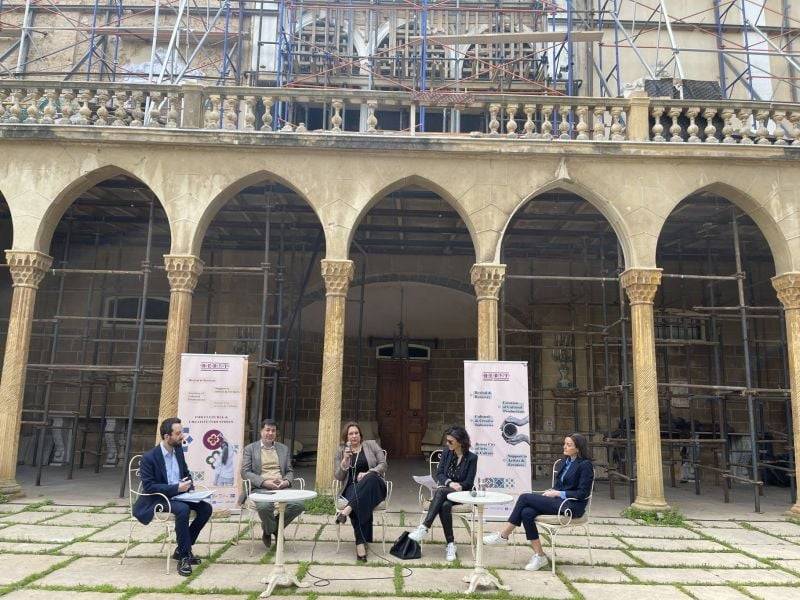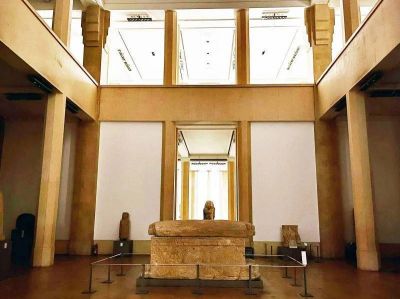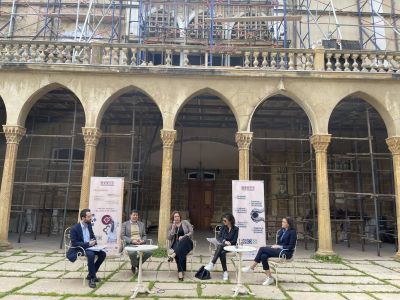
The announcement of the call for participation in the Beryt project took place in the gardens of the Sursock palace, a building itself badly damaged by the explosion at the port and today being renovated with the help of Li Beirut, UNESCO and the Swiss Federal Office of Culture. (Credit: DR)
The regional office of the United Nations Educational, Scientific and Cultural Organization (UNESCO) in Beirut has launched a call for proposals to develop cultural productions in areas affected by the explosion at the city's port on Aug. 4 2020. The initiative aims to revitalize cultural life in the Lebanese capital, which has been devastated by the blast and an unprecedented economic crisis. The $2.2 million funding will be shared among the most vulnerable groups, including associations, collectives, groups of artists, creators and cultural professionals in Lebanon.
The announcement was made in the gardens of the Sursock Palace, a building that was also destroyed by the explosion and is currently undergoing renovation with the help of the Li Beirut initiative, a joint project by UNESCO and the Swiss Federal Office of Culture.
The explosion caused extensive damage to some of Beirut's most historic and dynamic urban areas, which housed the city's creative hub, including its community of artists, numerous cultural spaces — such as galleries, cinemas, theaters, libraries and museums — as well as several workshops, designer shops and artisanal boutiques.
In 2015, the cultural and creative industries generated nearly 4.75 percent of Lebanon's GDP, with 6,350 businesses and about $2 billion in annual revenue, according to a study by the Bassel Fleyhane Institute of Finance on the economic contribution of cultural and creative industries in Lebanon, funded by the French Institute of Lebanon and the French Development Agency.
However, the explosion at Beirut's port and the unprecedented economic crisis in Lebanon have dramatically changed the situation.
According to Leila Rizk, a consultant to UNESCO for cultural and creative industries, the priority today is to ensure continuity by making sure that those who remain can pass on their know-how, whether artisanal or otherwise, to the younger generation. “There is a number circulating, we have no confirmation on it, but it is said that 60 percent of creators have left the country,” Rizk told L’Orient-Le Jour.
The goal is then to transmit, focus on young people (aged 18 to 35) "because they are the future of the country," and benefit from the expertise of those who have made Lebanon an important hub of creativity.
According to UNESCO's Beirut office, the UNESCO Beryt (Beirut housing rehabilitation and cultural and creative industries recovery) project, funded by the Lebanon Financing Facility (LFF), a multidonor trust fund administered by the World Bank, should directly benefit at least 65 formal and informal nonprofit cultural organizations and 85 cultural professionals, 50 percent of them women and 40 percent of them youth.
Additionally, about 10,000 people in local communities are expected to benefit indirectly. The support will also prioritize requests from economically vulnerable individuals, single-parent families, persons with disabilities and the elderly.
The activities to be funded are related to the creation, production, distribution and exhibition of cultural and creative activities, as well as the transmission of skills in the fields of performing arts and visual arts, including photography, fine arts and crafts, intangible cultural heritage, audiovisual and interactive media, literature and the press, as well as heritage and tourism.
Rizk, the specialist overseeing the Beryt project, acknowledges that the needs are much greater than the $2 million budget. However, she emphasizes the importance of the principle of providing assistance and highlighting the ability of the Lebanese people to revitalize their neighborhoods and create, and to accompany them throughout the process of giving Beirut a plural identity.
Through this project, UNESCO will offer both financial and technical support to help applicants express their needs, write a project proposal, build a budget, and conceive a vision of general interest within the framework of a cultural project.
The Beryt project leaders want this new initiative to create new foundations and a new logic for the cultural and creative sector in Beirut. The project aims to fill the major gaps left by an absent and incompetent state.
This article was originally written in French by Maya Ghandour and published in L'Orient-Le Jour. ChatGPT assisted us in its translation and summary. It was edited by L’Orient Today

